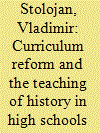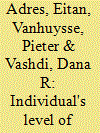| Srl | Item |
| 1 |
ID:
082689


|
|
|
|
|
| Publication |
2008.
|
| Summary/Abstract |
By 1925, 30 years after Kenya became a British colony, there were no high schools for Africans in the colony. In 1926, the Africans decided to build their own high schools through their Local Native Councils (LNCs) but the Government refused to sanction the building of the schools and this led to a protracted struggle. The Kiambu LNC's abortive high school at Githunguri is used as a case study to examine not only why the Government vetoed the building of the schools, but also to show how this greatly undermined the expansion of African higher education in subsequent years.
|
|
|
|
|
|
|
|
|
|
|
|
|
|
|
|
| 2 |
ID:
154231


|
|
|
|
|
| Summary/Abstract |
The last two years of Ma Ying-jeou’s (Ma Yingjiu) presidency saw the eruption of a controversy surrounding proposed revisions to the high school history curriculum. Although not the first time that the subject of history has exacerbated the tensions between holders of a China-centred view of Taiwan’s history and those favouring a more Taiwan-centred approach, this crisis, which took place mainly between 2014 and 2015, was undoubtedly the fiercest witnessed by the Taiwanese society in the sphere of educational issues. By putting the 2014–2015 dispute into perspective through a review of the different attempts made by the pro-Taiwan independence Chen Shui-bian (Chen Shuibian) and the pro-unification Ma Ying-jeou governments to edit the history curriculum, this article will underline the specificities of this particular controversy. This contribution will, therefore, help to shed new light not only on the perception of Taiwan’s history promoted by the Ma administration, but also the policy-making process which characterised the last years of Ma’s presidency.
|
|
|
|
|
|
|
|
|
|
|
|
|
|
|
|
| 3 |
ID:
109947


|
|
|
|
|
| Publication |
2012.
|
| Summary/Abstract |
The article inquires about the role of globalization on individual commitment to the state by studying the tendency of high school students to evade obligatory military service in Israel. We define five dimensions of the individual's level of globalism (ILG) and examine their impact on degrees of military service commitment. We suggest a new nondichotomous approach by considering, in addition to full evasion and full commitment to combat service, the option of quasi-evasion: to serve, but in a risk-free role. Investigating a sample of 2,705 eleventh and twelfth grade students, we find that quasi-evasion is widespread, involving 54 percent of all respondents and 40 percent of all males. More "globalized" individuals, those lacking active local ties and those with high levels of consumerism show a significantly greater tendency to evade military service. Counter to our expectations, students with lower levels of individualism also show a significantly greater tendency to evade military service.
|
|
|
|
|
|
|
|
|
|
|
|
|
|
|
|
| 4 |
ID:
184346


|
|
|
|
|
| Summary/Abstract |
The use of social media platforms by the education sector has grown significantly in the past decade. The advancement in information and technology has prompted the integration of social media use in education. Social media use has revolutionized the learning processes from what was traditionally teacher-centered to the current student-centered approach. People between 16 and 24 years of age are considered among the active users of social media; hence, by incorporating an important part of their lives in school activities, learning may become more amusing and improve performance. Despite the United Arab Emirates being considered the technological hub of the Middle East, it has made minimal steps toward integrating social media in the learning system for high school students. This article explores the type of social media used by students and teachers in the Emirati high school system and examines the favorable social media tools used in learning in high schools by teachers and students and responds to questions like the purposes of using social media in learning and does social media use in learning affect student and teacher satisfaction and attitude? Further, it asks what the impacts of using social media on learning are. Finally, it discusses the challenges students and teachers come across when using social media for learning.
|
|
|
|
|
|
|
|
|
|
|
|
|
|
|
|